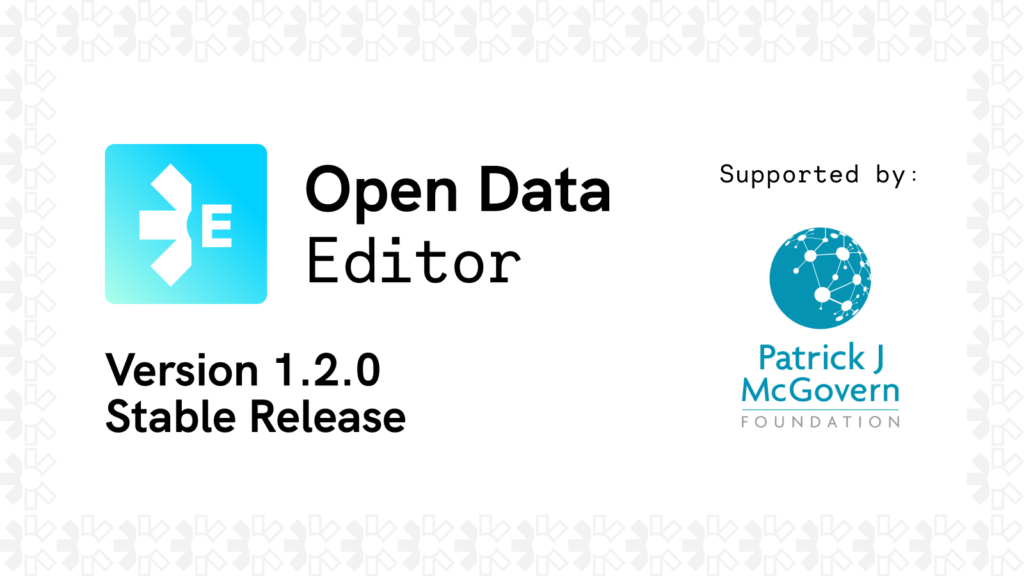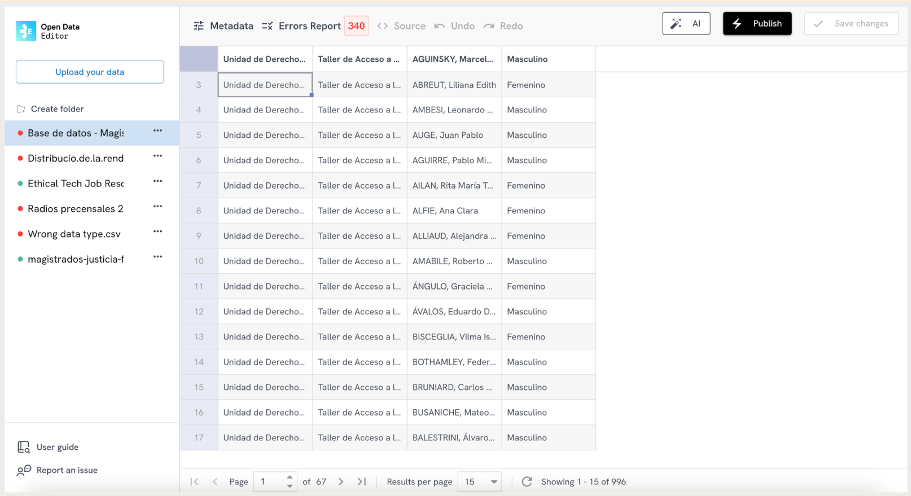
The Open Knowledge Foundation (OKFN) is happy to announce the release of Open Data Editor (ODE) 1.2.0, now a stable open source desktop application that makes working with data easier for people with little to no technical skills.

Background
At the beginning of March, thanks to the kind support of the Patrick J. McGovern Foundation, the ODE team started working on a new version of the application, up to that point known as Frictionless App. At that time, we decided to put all implemented features in the app under the microscope and talk to users to understand if what we built would help them make their data work easier. User research showed that people spent a lot of time exploring tables and checking the quality of their data to detect errors and correct them. Based on this insight, we reduced the total number of features offered by ODE to clearly build an app focused on one main task of detecting errors in tabular data.
Last October saw the release of version 1.1.0 of ODE, when the app entered a crucial phase of user testing. For two months, we carried out pilot programmes with two organisations with different data workflows: StoryData, a data communication project based in Barcelona which combines research, analysis and visualization with narrative to tell the story behind the data, and ACIJ – Asociación Civil por la Igualdad y la Justicia, an Argentine non-profit founded in 2002 that works to promote a more just and inclusive society, free from poverty and discrimination. In parallel, our team also led group and individual user testing sessions to check product functionalities, usability, etc.
Conversations with potential users provided relevant insights to prioritize our work for the stable release announced today. During that time we improved the following features:
Errors report panel

The way errors are shown in tables was changed to make them more digestible for users with non-technical skills. Although we know this feature needs more work, especially in terms of error explanation and language, we added an error counter, made improvements to how ODE was displaying tables in this panel, and toggled the panel to go full screen.
AI integration

A recent incorporation to the team as an AI consultant, Madelon Hulsebos guided and helped us reflect on how artificial intelligence could help ODE strengthen its core capability of improving data quality, in a transparent, privacy-preserving, and trustworthy way. After two months of work, we implemented an AI component to help users improve column names and column descriptions in their tables. In the future, the OKFN team expects to build a roadmap for more AI features for the ODE to further enhance its functionality and user experience.
Navigation, usability issues and code constraints
User testing sessions allowed us to detect some navigation problems and bugs that were addressed between October and December to make sure that the uploading, exploration and error detection workflows worked accordingly. In some cases, reported problems were connected to issues of using different software or externalities linked to how people commonly used some features in other tools. For instance, ODE’s text box for external data admits URLs from public spreadsheets without the HTML component. To address these types of problems we added some clarifications to ODE’s user guide.
What’s next?
Although the Open Data Editor is now on a stable version, we still have work to do. During December, we will work on implementing key UX changes to the metadata panel and refining the AI integration. We will also start a new phase of user testing sessions to collect insights from the stable release version and strategise the ODE work for 2025.
As we launch, we are committed to continuous improvement. Your feedback will play a critical role as we refine and expand features over time. Stay tuned for updates, and feel free to share your thoughts with us at info@okfn.org. Together, we’ll make ODE even better.
Read more
- The Open Data Editor is now ready for the pilot phase
- Are you a developer? Help us test the Open Data Editor!
- Open Data Editor: The tormented journey of an app
- Open Data Editor: 5 tips for building data products that work for people
- Open Data Editor: Meet the team behind the app
- Open Data Editor: What we learned from user research
- Announcement of strategic funding for the Open Data Editor
- Introducing Open Data Editor (beta): Towards a No-Code Data App for Everyone








